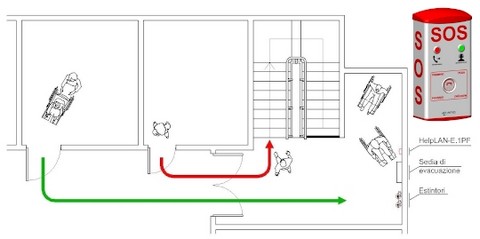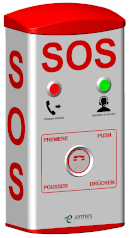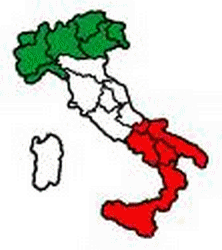 |
|
Two-way communication systems for refuge areas

Two-way communication systems for refuge areas that can be used by people with a wide range of disabilities and that comply with the recommendations of BS5839-9
|
|
In the design of safety systems in the event of a fire, it goes without saying that a public address system complying with EN54
should be provided to broadcast suitable announcements in the areas affected by the emergency in order to manage the evacuation
of the premises. |
However, it is often not adequately taken into account that people in the buildings subject to evacuation may have difficulty in following emergency procedures quickly because they suffers from different types of disabilities or are temporarily prevented by contingent events (e. g. a person put in plaster cast as a result of a fracture).

In this regard, attention is drawn to the Disability Discrimination Act 1995, which places duties on all employers and providers of services not to
discriminate against disabled people, and to make adjustments to their policies, practices, procedures or physical features of their premises, to
ensure that disabled people are not discriminated.
It is vital to ensure therefore, when making plans for the fire safety and management of buildings, that the requirements of disabled people are
properly taken into account at all times.
In order to comply with this requirement, the legislation provides that the structures and organisational procedures to be implemented to ensure
adequate management of evacuations in the event of fire provide for adequate "Refuge Areas". The rules define the "refuge area"
as a closed and fire-resistant zone, served directly by a safe route to the exit.
People in each refuge area need to be sure that their presence is known to the building's management. In order to address this
problem, there must be a two-way communication system which must be easily operable, the use of which is comprehensible to all
persons that need to use it and that complies with BS5839-9.
HelpLAN-ED.1PL and HelpLAN-ED.1PF/P are two units for IP emergency calls (the first for indoor use, the second for outdoor use)
particularly suitable for this application as they implement a self-test function that continuously monitors the efficiency of
each individual device and the integrity of the connection lines between the devices themselves, moreover some functions and
options make them easier to use for people with different types of disabilities.
Some of the features specifically designed to facilitate the use of these two-way communication units for people with different
types of disabilities are:
|
• |
the TAC (Touchless Activated Call) function, which consists of the possibility of activating the call by simply bringing the hand near the front of the device |
|
• |
the SAC (Sound Activated Call) function, which activates the call when the help point detects a sudden and abnormal change in ambient noise |
|
• |
the LAC (Led Aided Call) function provides information on the status of the call to the hearing impaired by means of two signalling LEDs in order to facilitate the dialogue with the operator of the assistance station |
|
• |
the AFILS (Audio Frequency Induction Loop System) function, which transmits audio so that it can be received by people using hearing aids designed for this function. |
(You can find documentation on two-way communication equipment for safe aeas HERE)
If you would like more information, please contact us by filling in the form HERE !
ERMES ELETTRONICA s.r.l. - Via Treviso, 36 - 31020 SAN VENDEMIANO - ITALY
Phone +39 0438 308470 - Fax +39 0438 492340 - email:
ermes@ermes-cctv.com



